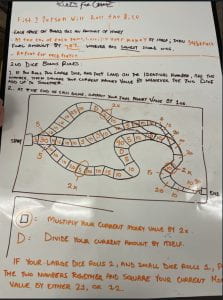Hey Y’all, Max here.
Time flies. Already it has been more than a month since school resumed, and we have already concluded a project. That project is Game of Exponent Laws, the first scimatics project this year; the game involved making a board game/ card game that included exponent laws. I worked on this game with Sylas, and throughout the project this demonstrates the curricular competency, applying and innovating ( working with a partner.)
The process that we went about making this game was pretty standard. We worked together, and equally contributed to the game. If I had to say we each had jobs, Sylas handled slightly more of the mathematical and numbers-related things, while I kept to my comfort zone, which is designing and creating the board. During this project we honestly didn’t have much to worry about. As far as my short-term memory is correct, we didn’t hand in anything late. The biggest issue we faced while working on this was maybe the board, because it was different sizes than we thought. Luckily, Sylas had a brand-new printer so we got around that hurdle.
As for the milestones, this project they were all over the place. It only feels like we did two or three of them, when we actually did six. Milestone 1 was making a simple dice-game. It looked like this when we finished:

Milestone 2 was a Khan academy quiz. Not much to say about this. Milestone 3, on the other hand, was a mess. In hindsight, I realize now that I know very little about advanced exponent laws, which is reflected on my 12/26 score. Yes, it is a very poor score, but there’s always room for improvement, right? Anyways, that’s in the past now. This demonstrates another curricular competency, by showing my mental math “strategies”.
Milestones four and five go hand-in-hand, because 4 is the first game rules draft, while 5 is the revised version. Our game is actually quite simple to play. It’s like Candy land mixed with monopoly. The objective is to erase as much debt as possible by collecting as much money as possible, and making it to end of the board before anyone else ( the point of the game is that you are committing tax evasion ). Anyways, our game was beginning to take shape, even from it’s earliest moments; We really didn’t feel the need to make it more complicated than it should be.


Milestone 6. Mr. Gross’s class and ours tried out each other’s games. It was a success, I think. I wasn’t around my own gam because I was either trying peoples games in our class, or trying games in Mr. Gross’s class. According to Sylas, it was a success.
To wrap this up, I’ll give my opinions on this project, then answer the diving question.
I think that for the first project back in school, this was a decent project. It was simple compared to other projects, and there was only so much you can do with exponents in a board game. My final score out of 10 for this project would be a 5. As for the driving question, this tie around it was: “ How does math make games more complex, interesting, and re-payable?”
My answer to this question is simple: It doesn’t. Math is not supposed to be in games; card games, board games, even video games ( unless it’s Dr. Ryutaro Kawashimas Brain Age. ) The only math I would be willing to do in game is add 4 to my hand in UNO. Math in games is not appealing, if anything it makes the game harder to play, and less attractive. So there you have it.
